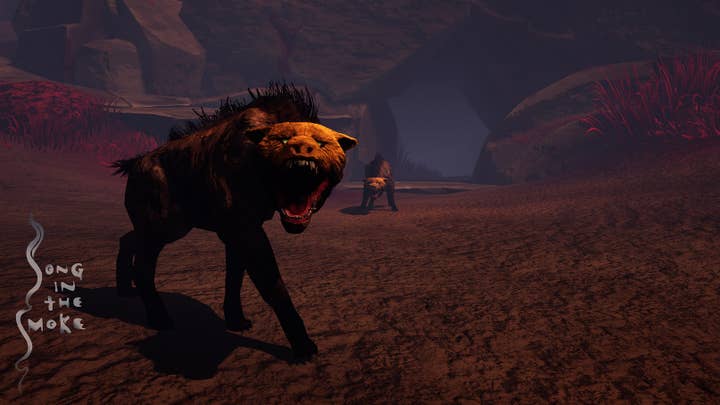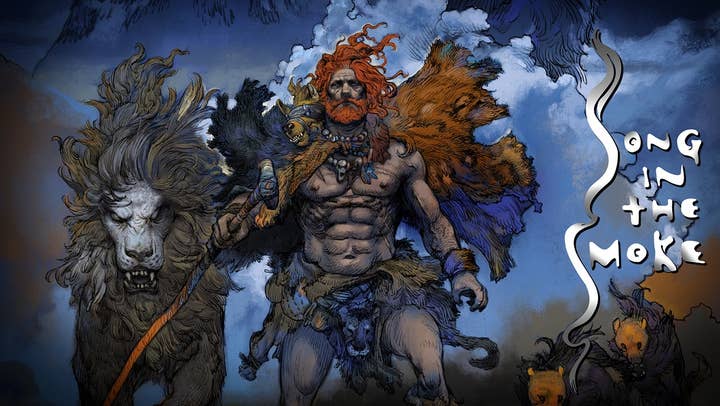Launching a VR game these days is "A perfect storm of shit"
17-bit's Jake Kazdal speaks frankly about the difficulty of launching the survival game Song in the Smoke last month
With 2013's Skulls of the Shogun and 2016's Galak-Z, Kyoto-based 17-bit was establishing itself as a boutique studio for retro-inspired 2D games. But as development on Galak-Z wound down, 17-bit CEO Jake Kazdal tells GamesIndustry.biz he had developed a "burning passion to check out this new medium that was VR and see what it was all about."
"I'd long wanted something that was completely absorbing of all your senses and I think in terms of interactive media, there's not much higher to shoot for than something really engaging in VR," he says. "It really is an incredible next step as a gaming medium."
That was how 17-bit got started on Song in the Smoke, its third title and first VR game, which launched last month. When we ask what it's like to launch a VR game in late 2021, Kazdal doesn't mince words.
"It's a perfect storm of shit, to be frank," he acknowledges. "As a studio, we are so focused on gameplay and the experience as a whole. And a huge part of that experience for us as developers is this overlap with the users and this communication with the outer world.
"Normally, with Skulls of the Shogun and Galak-Z, we're showing at multiple PAXes, TGS, E3, and all these shows. We're getting tons and tons of feedback. We're watching 1,000 people play the first hour of the game. We're getting so much great feedback on where the game is at, what we need to work on and the speedbumps that are preventing people from really being able to understand the experience and digest it.
"With VR, it's a lot harder on a good day because it is such a solitary thing... And then you couple that with this whole COVID bullshit and no trade shows. And even if there were, it's not like people are going to be willing to put on a headset that's been on 1,000 other people's faces. We had so little user feedback moving into this that it was really difficult for us."
"Across the board, this has just been unfairly, completely smash-at-the-knees from day one"
Kazdal said the feedback the studio was able to get was good, but it was coming from a small group of hardcore gamers so it offered a somewhat limited perspective compared to broader playtesting. As a result, they held the game back to focus on tuning and polishing it.
That extra time appears to have paid off in terms of response, as Song in the Smoke's Metacritic average and Steam user reviews and both in line with 17-bit's previous titles.
"In the 25 years or so I've been doing this stuff, this is easily the most challenging product I've ever done for all these reasons," Kazdal says. "VR, new medium, remote development, lack of consumer engagement stuff... Across the board, this has just been unfairly, completely smash-at-the-knees from day one."
As for Song in the Smoke's financial fate, it's too early when we talk to determine that. Fortunately, Kazdal's expectations for the game were modest to begin with, and 17-bit is built to withstand an occasional perfect storm of shit.
"One of our guiding principles as a studio is to try to get enough funding to weather the storm and be able to commit to the quality of the product you're promising publishers, and not really depending on outward-bound sales, really," Kazdal says. "Because every one of these games is a crap shoot. The stupidest, simplest, weirdest thing can be the next wonder hit, and the most well-crafted, amazing, highly regarded indie uber hit can be a sales failure. There's no logic or real science to it that I can discern."
For example, Song in the Smoke received funding support from both major VR platform holders, Oculus and Sony. Kazdal says the studio might not have been able to justify making the game otherwise.
"If you're looking for the next gold rush, you should probably look elsewhere [than VR]"
"You can probably count on two hands how many VR games have broken through the barrier and made a bunch of money," he says. "So if you're looking for the next gold rush, you should probably look elsewhere.
"But these platform holders need quality content, and they need people who can bring them quality games and quality content. And they're willing to invest in that space to get that content. So whether you're a big sales success or not is kind of outside the equation for us. It's more like, who believes in you and your ability to bring a quality product to market? And who's willing to invest in you to make ends meet enough to be able to invest in the right people and the right tools to make a kickass experience?"
On the PlayStation side, Kazdal says the VR market is between phases, with interest in PSVR cooling down and PSVR2 hype not fully arrived. As for Oculus, while he initially took a dim view of the Quest because of his insistence on visual fidelity, in hindsight he believes the lower barriers to entry the self-contained VR system offers have been a more than worthwhile trade-off.

Kazdal describes VR as a challenging market and -- at the moment -- a small one, but he is optimistic about its outlook.
"I kind of can't believe how long it's taking to get going," he says. "Because as a user, you get in there and it's like, 'Oh my god, this is a whole other dimension of fidelity with interaction, experience, and immersion on all fronts. It's stunning and it surprised me it didn't take the world by storm in the way I thought it would because I was so absolutely blown away by it on day one."
As for the latest wave of companies positioning VR as a stepping stone to the metaverse, Kazdal absolutely agrees with them.
"Cell phones are going to phase out, laptop computers are going to phase out. I think over the next decade, everything's going to move into the mixed reality space, undoubtedly"
"I do think it's going to transform how we shop, how we experience entertainment, how we game," he says. "It's just way better. It's too much better to not take it seriously. I do think cell phones are going to phase out, laptop computers are going to phase out. I think over the next decade, everything's going to move into the mixed reality space, undoubtedly. And I think VR is driving these interface designs, these interaction methods, this expectation for being able to experience something virtually, to sit in a car or look at clothing on someone your size.
"All these things VR does so well and so powerfully are so much more than any flat-screen display can offer you. And I think with the funding going into it, exploring the space and building it out, it will be the ground floor of the next generation of everything in digital media. Shopping, gaming, passive media consumption... All these things will radically change over the next decade, and I think anyone involved in the space can really see that pretty clearly at this point, even if the market isn't quite supporting it just yet."
But even if he's optimistic about what's coming around the corner for VR, it doesn't sound like 17-bit is going to be part of it. Not right away, at least.
"I don't think we'll be exploring VR in the short-term again," Kazdal says. "There's some fatigue for sure in the studio. Development in VR is very challenging, there are a lot of technical challenges that are constantly overhanging. It's a lot of work to just have that thing on your head all day, to be diving in and diving out, fighting with controllers that aren't synching... It's just a whole suite of extra challenges to get going in this stuff.
"We all love game development very much and we're excited about the next project, but it is a radical departure again. I think as I'm approaching 50 years old, I'm realizing I have a finite amount of titles left in my years, and I really want to explore different genres and dive deep into these different types of games I've grown up playing and loving."


